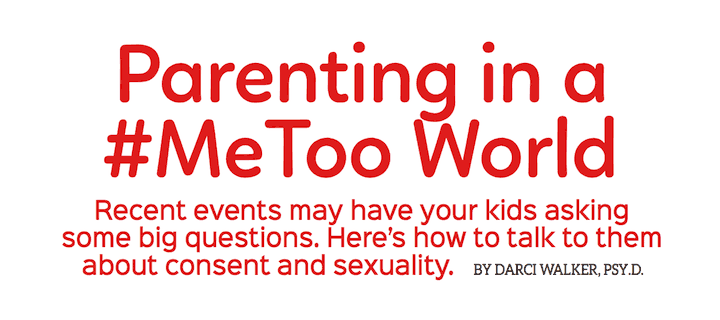
It’s impossible to turn on the television or log into social media these days without seeing or hearing about rape culture. While this onslaught can be overwhelming, triggering and infuriating, it is also a time of great hope, optimism and movement.
And that’s where we come in as parents: How we talk with our kids about sexism, misogyny, and assault matters. How we talk with them about consent, respect, healthy sexuality, and boundaries can not only help them understand what they are seeing and hearing in the media, but helps create a next generation that treats each other differently.
First, we need to get rid of the idea that we gear up for a one-time sex talk and then hope for the best. Rather, sex and sexuality need to become everyday dinner table conversations, creating a culture of open communication and dialogue with our kids. It’s never too early (and it’s also never too late!).
Preschool: Introduce the concept of consent often and frequently. There is no reason why all kids can’t learn about consent in play, consent with sharing toys and consent in touching other people’s bodies. There are so many opportunities to practice this concept with our little ones. “You want to hug your friend? Did you ask first? Did you get consent?” “You want to wrestle with your brother! Did you get consent?” “Can you check in with your friend and make sure that game works for everyone?”
Helping kids at this age understand that they have autonomy over their body, and other people have the same right, is the main goal. And that means we also need to honor a child’s right to say no. “Looks like you don’t want to give Grandma a kiss goodbye. That’s okay. Would you like to wave instead?”
Elementary: Kids this age may have more access to media, hear things from other kids at school and have more direct questions about what they are seeing or hearing. As with all hard topics (death, religion, sex) “drop by drop” is a good rule of thumb. That means offering small amounts of true and digestible information to them, and then waiting. Kids will ask for more, and stop asking when they have had enough. Follow their lead.
Use the same language around consent: “Sexual harassment is when someone touches or makes comments to another person when they didn’t get consent.” When conversations about sex and sexuality are frequent, open and comfortable, then neither we nor our children have to feel the awkward pressure of explaining it all at once.
It’s helpful to talk about these dynamics in terms of your kids’ own lives. This stuff happens on the playground all the time. So, when your daughter complains about a boy teasing her on the playground, understand that saying “Well, he probably likes you!” is actually supportive of rape culture. Instead we need to say “I bet that doesn’t feel good. He didn’t ask for your consent. Let’s talk about your options …” Parents of boys can have similar conversations.
Teens: Teens these days are experiencing a totally different world of media and sexuality than we did. We do not have the luxury of passively standing by and letting them figure out sex on their own. We need to create spaces in which they can feel comfortable asking us hard questions about sex and relationships, and learn that healthy sexual relationships should feel good physically, mentally and emotionally. This means helping them understand what healthy sexuality means and what expectations they can have for themselves and for others.
The #MeToo movement and constant media coverage of unhealthy or power-motivated sexual scenarios gives us lots of opportunities to open up conversations about what teens are experiencing. Sit down to watch just about any television show with your teen and you will have the opportunity to say, “What do you think of that?”
The rule with teens is don’t assume that because you haven’t told them, they don’t know. Don’t assume they haven’t already had some experience with it, and don’t assume they aren’t thinking about it. Ask them their opinion. They have one — guaranteed! And then be open to the discussion, wherever it goes.
Darci Walker, Psy.D. is a clinical psychologist specializing in parenting and families. She is the author of the blog Coreparentingpdx.com and lives with her two children in Portland.
- Parenting in a #MeToo World - January 24, 2018




